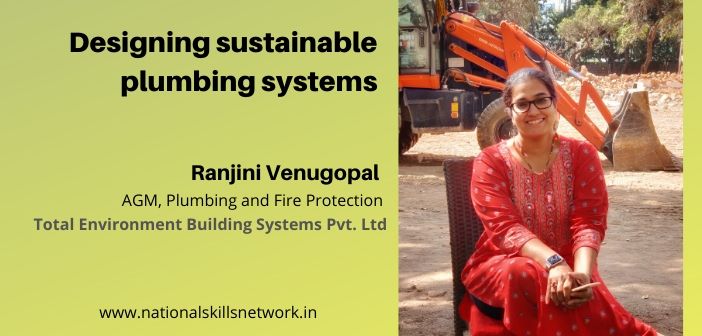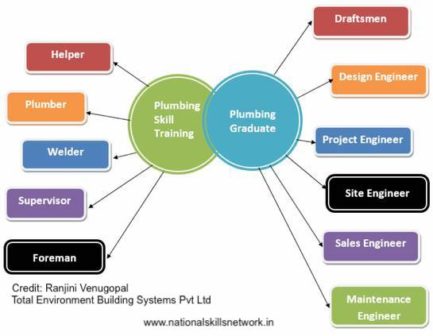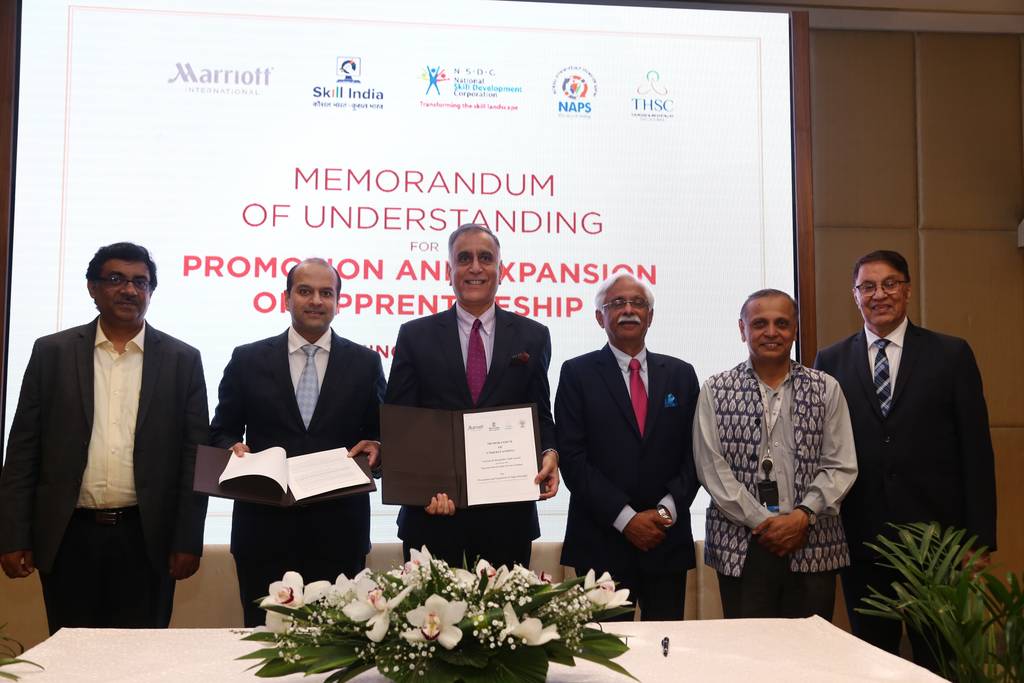“The attitude of a Plumbing professional must be gratitude towards the nature”, says Ranjini Venugopal, AGM , Total Environment Building Systems Pvt. Ltd. Plumbing is part of our homes, offices, malls and other buildings that we use on a regular basis. With increased challenges of designing plumbing systems for sustainable use of natural resources, we need trained workforce, advanced plumbing systems and eco-friendly designs. In this Skill Talk, Ms. Ranjini talks about the higher education prospects in plumbing, various job roles, how different fields require different plumbing designs, and the need for nature-friendly plumbing systems.
Q: Tell us about higher education prospects in plumbing – how do we show a path to those who qualify from ITIs and short-term training programs like PMKVY etc?
A: Higher education is a major conduit of talent leading to increased opportunities and individual development paving way for a person to achieve expertise in one aspect of a huge domain. With increasing use of technology in service industries, every year we see enormous growth in plumbing engineering applications. This demands a skill upgrade to avoid gap and skill mismatch in the labour market. Tertiary education criteria such as post-school job-oriented diploma, certified programmes in Plumbing like Master Plumber Programmes offered by IAPMO India (International Association of Plumbing and Mechanical Officials India), Training at Ashirvad Plumbing School for Plumbers shall be a channel to fill the gap between the skills required in the market.
For engineering graduates, courses like Certified Plumbing Engineer by IAPMO India, IGBC LEED Certified Professionals and GRIHA Certified Professionals are few options. Technology improvement skills, and employment for youth through facilitating on-the-job training will definitely set a career path for ITI qualifiers. Career and educational opportunities, together drive “brain drain gain and recirculation”
 Q: If a student could choose one specialization in plumbing, what should that be according to you?
Q: If a student could choose one specialization in plumbing, what should that be according to you?
A: I prefer Green Plumbing. Plumbing that deals with the use of energy saving fixtures, appliances, environment friendly and new innovative technologies that are known for economical and sustainable system design.
Q: What are different roles one can get into after completion of their education and training in plumbing?
A: A wide range of plumbing opportunities are available to those who want to take up plumbing as a career. There exists a high demand in the skill trades, a need for young and proficient plumbing professionals making it a perfect career option to take after graduation.
Q: As you have a wide range of experience across fields like fire systems, environmental engineering and public health, please tell us how differently are the plumbing systems designed for each of these?
 A: The future of Plumbing Engineering lies in the ability to design systems with the “whole building” in mind using, preserving, and respecting the natural earth systems of recycling air, waste, and water. Earth has an intricate and sensitive recycling system that converts air, water, and solid wastes generated, through plants, soil, and evaporation to fresh water and air for consumption. Plumbing Engineering influences the water efficiency, safe sewage disposal, energy, fire protection, and sustainability. Plumbing Engineering follows:
A: The future of Plumbing Engineering lies in the ability to design systems with the “whole building” in mind using, preserving, and respecting the natural earth systems of recycling air, waste, and water. Earth has an intricate and sensitive recycling system that converts air, water, and solid wastes generated, through plants, soil, and evaporation to fresh water and air for consumption. Plumbing Engineering influences the water efficiency, safe sewage disposal, energy, fire protection, and sustainability. Plumbing Engineering follows:
- Design of Process and Water Flow Systems
- Design of Plumbing Systems
- Design of Water Heating Systems
Fire protection engineering is the application of science and engineering principles to protect people and their environment from destructive fire.
For most projects, fire protection engineering is largely practiced through the application of prescriptive codes and standards. For broad classifications of occupancies or fire hazards, prescriptive codes and standards identify, in very specific terms, exactly how individual fire protection systems are to be designed, installed, tested, and maintained.
“Performance-based design” is a tool that can be used to look at fire safety from a “whole building” perspective. “Performance-based design” is an engineering approach to fire protection design based on:
- established fire safety goals and objectives,
- analysis of fire scenarios, and
- quantitative assessment of design alternatives against the fire safety goals and objectives using engineering tools, methodologies, and performance criteria.
Q: Your views on how plumbing systems should be designed for sustainable use of resources?
A: Water and energy are the two conservation factors at the heart of any sustainable plumbing system design. The entire concept behind sustainable plumbing is to save as much water as possible and to reduce energy use, as they are interdependent.
Sustainable plumbing has developed several types of alternatives to the traditional systems. The new systems are more energy efficient and reduce water wastage.
The first issue in plumbing system is energy usage. Energy use is both quantifiable and significant in sustainability. Environmental Protection Agency (EPA) estimates that at least three percent of our electric energy use is associated with simply moving and processing drinking water and providing wastewater utilities. That is approximately 45 million tons of greenhouse gas per year. At least 20 percent of all energy consumed in homes is used to heat water. This percentage continues to grow as other areas of the home like space conditioning become more efficient. This aspect must be adopted while designing plumbing systems.
The second most important issue to address in plumbing systems is water use. As increasing population create greater demand for fresh water, the existing sources are not sufficient against demand and supply.
Significant water and energy savings (up to 40 percent) can be realized by improving the design of plumbing systems. These savings are easily attainable, and simply involve some preplanning and deliberate design techniques.
The future of eco-friendly plumbing is squarely focussed on saving the environment, improving comfort and hygiene and saving builders and home-owners money at the end of the day.
Q: What must be the attitude of a plumbing Engineer?
“The attitude of a Plumbing professional must be gratitude towards the nature”
A: As a Plumbing Engineer, I feel that the mindset of a designer plays an important role in efficiently employing the innovative energy saving methods. An attitude of optimizing the cost and the goal of saving mother Earth from anti-natural techniques definitely creates a lively space to live. Plumbing is one among the critical fields where this change is necessary.













